- Home
- Rabindranath Tagore
The Boat-wreck Page 17
The Boat-wreck Read online
Page 17
‘I’m on your side too, Annada-babu; we’re all acolytes,’ said Nalinaksha. ‘We will take ourselves wherever there is a possibility of learning.’
Jogendra said impatiently, ‘No, this isn’t good. Nalin-babu, you cannot laugh away the accusation that no one can be your friend, that anyone who comes close to you will inevitably earn a reputation as your disciple. Give up all these things you spend your time on.’
‘What are these things?’
‘I’ve heard that you perform the praanayam every morning, you gaze at the sun at dawn, you follow all sorts of rules and rituals over your food – all this makes you a misfit in a crowd.’
Hemnalini lowered her eyes, taken aback by Jogendra’s brusqueness. Nalinaksha said, smiling, ‘Jogen-babu, it is indeed wrong to be a misfit in a crowd. But whether it is a garment or a man, are they always a perfect fit? The function of a garment does not change from one to the next – but the design varies according to the creator’s inclination and skills. A man also has a unique design, beyond the common functions of all men – do you wish to undo this? I also find it surprising that the harmless rituals I perform in the privacy of my own room, away from prying eyes, are nevertheless observed and discussed.’
‘Don’t you know why? Those who have taken the responsibility for improving the world consider it their duty to ferret out what is happening inside other people’s homes. They even have the ability to fill the gaps in the information they have gathered. How else is the world to be reformed? And besides, Nalin-babu, the things that most people do not do become visible even when done by one or two like you in private, while the things that everyone indulges in catche no one’s eye. Take your own case, our Hem has observed your rituals on the roof – she was telling Baba about them – and yet she has not taken the responsibility of reforming you.’
Hemnalini’s face reddened; just as she was about to say something to convey her unhappiness, Nalinaksha told her, ‘You must not be embarrassed. Who can blame you for having noticed my religious rituals while you were strolling on the roof? Don’t be ashamed of possessing a pair of eyes, I am guilty of it too.’
‘And besides, Hem did not express any distaste for your rituals,’ Annada-babu added. ‘She only asked me some questions about them, with great respect.’
Jogendra said, ‘I don’t understand all this. But I see no difficulty in leading a simple life – I do not think there is much to be gained from performing strange acts in secret. On the contrary, it disturbs the equilibrium of the mind and makes a person obsessed with certain things. But do not be angry at what I say – I am a rather ordinary man, I occupy an average place in this world. I have no possibility of reaching those who are on a pedestal of any kind except by tossing pebbles at them. There are innumerable people like me. Therefore, if you abandon everyone to disappear in some strange realm, you are bound to have stones hurled at you.’
Nalinaksha said, ‘Stones are of different kinds. Some touch you, some leave a mark. If someone were to say, the man is mad, the man is childish, it does no harm. But when they say, the man is playing leaders and followers, that he is trying to become a seer and attract disciples, to laugh it away needs a quantity of laughter that not even an endless supply can produce.’
‘But I repeat, don’t be angry with me, Nalin-babu. You can do as you please on your own roof, who am I to object? All I have to say is that no one will talk if you contain yourself within the boundaries of what is commonplace. I am content to live as everyone else does, to do more would attract a crowd. It does not matter whether they abuse or revere, but how comfortable is it to spend your life surrounded by a mob?’ Jogendra rose to take leave.
‘Where do you think you’re going, Jogen-babu? You cannot run away after forcing me off the roof onto the ground.’
‘I’ve had enough for today, no more. I’ll be back later.’
After Jogendra left, Hemnalini lowered her face and proceeded to lay siege, unnecessarily, to the tassels of the table-cloth. An investigation would have revealed moisture on the tips of her eyelashes.
As she spent more time in Nalinaksha’s company, Hemnalini discovered the emptiness in her heart and grew desperately eager to follow in his footsteps. At a time when she could find no support within or without herself during her grief, Nalinaksha revealed the world to her in a new way. For some time, she had been keen on following the rules of abstinence, for rules were a source of firm support for the mind. Not just that, grief did not limit itself to the heart, it also sought to prove its existence through an ascetic existence. Hemnalini had not yet succeeded at this. Shrinking back from public view, she had kept her suffering within herself. Following Nalinaksha’s methodology, she felt a great satisfaction at adopting pure vegetarian diet. Removing her rug and carpet, she concealed her bed behind a screen in one corner, and cleared her room of all other furniture, keeping only some flowers in a bowl. She began mopping the floor herself every day. After her bath, she dressed in white clothes and sat down on the floor, the window letting in unrestricted light. With the help of this light, this sky, this wind, she cleansed all that lay within herself. Annada-babu could not join her, but he felt a glow of pleasure at the joyful radiance that these practices had brought to Hemnalini’s face. Whenever Nalinaksha visited, it was on the floor of this room that the three of them sat and talked.
Jogendra began to rebel. ‘What is all this? All of you are turning the house into a shrine – someone like me can no longer set foot in here.’
Earlier, Hemnalini would have been disconcerted by Jogendra’s taunts. Now, Annada-babu flew into a rage sometimes at Jogendra, but Hemnalini joined Nalinaksha in smiling calmly. She had started placing her faith in certain things without allowing doubts to intervene – she considered embarrassment over this a weakness. She knew people laughed at her, but her reverence for – and trust in – Nalinaksha had helped her overcome such responses. So she no longer shrank back from them.
One morning, Hemnalini was sitting in silence near the window, having completed her bath and meditation when Annada-babu entered with Nalinaksha. Hemnalini’s heart was full – at once she touched both her father’s and Nalinaksha’s feet in reverence. Nalinaksha was embarrassed. ‘Don’t be perturbed, Nalin-babu,’ Annada-babu told him. ‘Hem is doing her duty.’
Nalinaksha did not usually visit them so early in the morning. So Hemnalini looked at him with curiosity. Nalinaksha said, ‘I have heard from Kashi that Ma isn’t well, so I have decided to take the evening train home. I have to complete as much of my pending work before that, so I am here to take your leave now.’
‘What can I say,’ said Annada-babu. ‘Your mother is ill, may God ensure her speedy recovery. We shall never be able to repay you for everything we have received from you over these past few weeks.’
Nalinaksha said, ‘You must know that I have received even more from you. You have not only extended a helping hand to a neighbour, as is normal, you have also brought new life with your respect for the ideas that I have been pondering over all by myself. My thoughts and pursuit of knowledge have, thanks to your support, become twice the sanctuary for me. I have realized how easy it is to attain success with the cooperation of other’s people’s hearts.’
Annada-babu said, ‘We desperately needed something for our souls, but without knowing what it was. That was when you came to us and we realized that we could not have done without you. We are very lazy and do not meet people very often. You could say we’re utterly devoid of the inclination to go to public meetings and listen to lectures. Even if I might rouse myself to go, it is impossible to get Hem to budge. You can’t imagine how wonderful it was to attend your lecture when Jogen told us about it. This has never happened before. You must remember all this, Nalin-babu. You will realize that we need your presence in our lives, or else this could not have happened. We are your responsibility.’
‘You must remember too that I have not revealed the deepest truths of my life to anyone other than you. Being able to tell
the truth is the greatest education about it. It is only because of you that I have experienced this heartfelt need for expressing it. So you must not forget, either, how much I needed both of you.’
Hemnalini had not spoken, gazing quietly at a patch of sunlight on the floor. When it was time for Nalinaksha to leave, she said, ‘Do let us know how your mother is.’
As soon as Nalinaksha rose to his feet, Hemnalini lowered herself to the floor to touch his feet in reverence.
44
Akshay had not made an appearance these past few days. After Nalinaksha left for Kashi, he was seen again at teatime with Jogendra. Akshay had decided that the easiest way to gauge how deeply Hemnalini still thought of Ramesh was her indifference to him. Today he saw that Hemnalini was calm, her face not contorting when she saw him. With an easy pleasantness, she said, ‘And why haven’t we seen you all these days?’
‘Are we worth seeing every day?’ said Akshay.
Smiling, Hemnalini said, ‘If you consider people not worth meeting without this qualification, many of us would have to adopt a solitary life.’
Jogendra said, ‘Akshay had expected to steal the show by being the only one to display humility, but Hem has gone one better by being humble on behalf of the entire human race. However, I have something to say about this, too. It is only we ordinary people who are worth seeing every day – the extraordinary are best seen only occasionally, for it is difficult to bear them more often. That is why they wander about in forests and mountains and caves – were they to live permanently in a human settlement, ordinary mortals like Akshay and Jogendra would have had to flee to the mountains and forests.’
The barb pierced Hemnalini. Without replying she made three cups of tea, and placed them in front of Annada-babu, Akshay and Jogendra. ‘Aren’t you having any?’ asked Jogendra.
Hemnalini knew she would now have to hear harsh words, but still she said with serene confidence, ‘No, I have given up tea.’
Jogendra said, ‘So the asceticism begins in right earnest! Does the tea-leaf not have sufficient spiritual energy? Is all of it concentrated in rare fruits? This is trouble. Forget all this, Hem. If a cup of tea destroys your yoga, let it – not even indestructible things last in this world, and to walk amidst such fragility is impossible.’
Pouring a cup of tea himself, Jogendra placed it in front of Hemnalini. Without stopping him, she asked Annada-babu, ‘Only tea for you today, Baba? Nothing more?’
Annada-babu’s hands and voice both began to tremble, ‘I tell you the truth, Ma, nothing at this table is palatable to me any more. I have been trying to tolerate Jogen’s diatribe in silence, for I know that my state of body and mind may lead me to say things that I will regret afterwards.’
Hemnalini went up to her father’s chair, saying, ‘Don’t be angry, Baba. Dada wants me to have a cup of tea, nothing wrong with that; I don’t mind. You must eat, Baba – I know having tea without any food makes you sick.’
Hem handed her father the bowl of food she had brought for him. Annada-babu ate slowly.
Returning to her stool, Hemnalini was about to take a sip from the cup of tea Jogendra had made for her. Akshay intervened, ‘Excuse me, you must give me that cup, mine’s empty.’
Rising to his feet, Jogendra took the cup away from Hemnalini and told Annada-babu, ‘Forgive me, I was wrong.’
Annada-babu could not answer. Tears began to stream from his eyes.
Jogendra led Akshay out. Annada-babu finished his meal and went upstairs on trembling legs, holding Hemnalini’s arm.
That night Annada-babu had a bout of colic. Examining him, the doctor said his liver was affected – the disease had not made inroads into his body yet; spending six months or even a year at a healthy place somewhere outside Calcutta would cure him.
When the pain had receded and the doctor had left, Annada-babu said, ‘Come, Ma, let us go to Kashi and live there for a while.’
The same thought had occurred to Hemnalini. After Nalinaksha’s departure, her mission of self-denial had begun to weaken. His presence used to provide strong support to her rituals. The unwavering determination and glow of serene joy on his face would make Hemnalini’s faith bloom. His absence had put a dark shadow on her enthusiasm. That was why Hemnalini had performed all the rituals prescribed by Nalinaksha with extra attention and frequency today. But this had brought on so much fatigue that a state of despair had descended on her – she could not stop her tears. At tea, she had engaged herself determinedly in offering hospitality, but something was weighing her down. The agony of her earlier memories had besieged her with twice as much force – once again her heart was poised to drift like someone without home or sanctuary. So when her father proposed going to Kashi, she said eagerly, ‘Yes, Baba, that will be for the best.’
Observing the preparations for a journey the next day, Jogendra asked, ‘What’s all this?’
Annada-babu said, ‘We are going away.’
‘Where?’ asked Jogendra.
‘We will pick a destination once we start travelling,’ said Annada-babu. He was reluctant to reveal to Jogendra straightaway that they were going to Kashi.
‘I cannot accompany you this time, however,’ said Jogendra. ‘I have applied for the headmaster’s post, and I am waiting for the response.’
45
Ramesh returned to Allahabad from Ghazipur early in the morning. There weren’t too many people on the roads, and the grip of winter made the trees stand stiffly, wrapped in their covering of leaves. A white mist hung over the houses, as still as swans on their eggs. Ramesh was seated in a carriage trundling along the deserted street. Beneath his thick overcoat, his breast throbbed continuously to the currents of his restless heart.
Stopping the carriage outside the bungalow, Ramesh got out. He had expected Kamala to have heard the sound of the vehicle; perhaps she would be standing in the veranda. He had bought an expensive necklace in Allahabad with the intention of putting it around her neck himself; he pulled out the box from the pocket of his overcoat.
Ramesh found Bishan, their servant, sleeping peacefully in the veranda, while the doors were all shut. He stopped despondently, and then called out loudly, ‘Bishan!’ He thought this would wake up anyone sleeping inside. But the need to awaken someone struck a discordant note in his heart – he himself had not slept half the night.
Bishan did not wake up even after two or three loud cries; he had to be shaken awake. Bishan stared at Ramesh, stupefied. ‘Is Bahu-ji at home?’ asked Ramesh.
Bishan did not seem to comprehend the question at first. Then, suddenly startled, he said, ‘Yes, she is.’
He lay down again with the intention of going back to sleep.
The door opened as soon as Ramesh pushed it. Wandering around the rooms, he did not see anyone. Still he called out loudly, ‘Kamala!’ There was no response. He went up to the neem tree in the garden outside, looked in the kitchen, the servants’ rooms, even the stables, but Kamala was nowhere to be seen. The sun had risen by then, the crows had started cawing and one or two women with pitchers could be seen making their way to the draw-well in front of the bungalow for water. Across the road a village woman had begun pounding grains in her yard, singing in a strange high voice.
Returning to the bungalow, Ramesh found Bishan deep in his slumber once more. Bending, he began to shake him vigorously; he caught the stench of alcohol on Bishan’s breath.
Recovering his senses under the force of the shaking, Bishan jumped to his feet. ‘Where is Bahu-ji?’ Ramesh asked again.
‘She’s inside,’ said Bishan.
Ramesh asked, ‘Where? I can’t find her.’
‘But she came here yesterday.’
‘Did she go somewhere?’
Bishan stared at Ramesh in surprise.
Suddenly a red-eyed Umesh appeared, dressed in a dhoti with a colourful wide border and a shawl. ‘Where’s Ma, Umesh?’ Ramesh asked him.
‘Ma has been here since yesterday,’ said Umesh.
&n
bsp; ‘Where were you?’ asked Ramesh.
Umesh said, ‘Ma sent me off to Sidhu-babu’s to watch the play.’
The coachman came up to Ramesh and said, ‘My fare, Babu?’
Ramesh got back into the carriage and went to Chakraborty’s house. There he found everyone in a state of agitation. Ramesh thought Kamala had fallen ill, but that was not the case. Last evening, Uma had suddenly started crying at the top of her voice, her face turning blue and her limbs cold, frightening everyone. They had all been busy with her treatment, no one had slept at night.
Ramesh assumed that Kamala must have been sent for because of Uma’s illness. ‘Kamala must be very worried about Uma,’ he said to Bipin.
Bipin did not know with certainty whether Kamala had come last night or not, so he echoed Ramesh in a way, saying, ‘Yes, she loves Uma so much, she must be anxious. But the doctor says there is no reason to worry.’
With reality not living up to his imagination, Ramesh was dismayed. There seemed to be a divine obstacle to his union with Kamala, he concluded.
Umesh arrived from Ramesh’s bungalow. He was allowed into the inner chambers here. Shailaja was also fond of this boy. As he was about to enter her room, Shailaja came out quickly for fear that Uma might wake up.
‘Where is Ma, Mashima?’ asked Umesh.
Shailaja said in surprise, ‘But you went to the bungalow with her yesterday. We were supposed to send Lachhmania in the evening, but we could not because of Khuki’s illness.’
‘I didn’t see her there this morning,’ said a downcast Umesh.
‘What!’ said a perturbed Shailaja. ‘Where were you last night?’
‘Ma didn’t let me stay. As soon as we got there she sent me off to watch the play at Sidhu-babu’s.’
‘And so off you went! Where was Bishan?’
‘Bishan has no idea. He drank too much last night.’
‘Go fetch Babu at once!’
When Bipin came in, Shailaja said, ‘Something terrible has happened.’

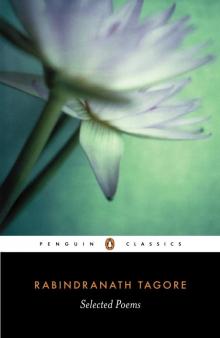 Selected Poems
Selected Poems The Lover of God
The Lover of God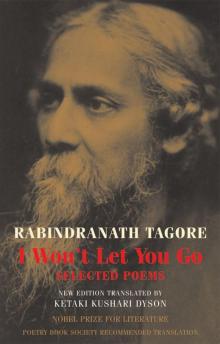 I Won't Let You Go: Selected Poems
I Won't Let You Go: Selected Poems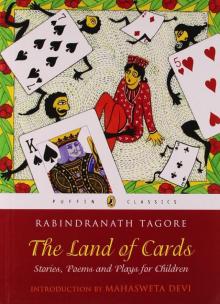 The Land of Cards: Stories, Poems, and Plays for Children
The Land of Cards: Stories, Poems, and Plays for Children The Tagore Omnibus, Volume One
The Tagore Omnibus, Volume One The Boat-wreck
The Boat-wreck Chokher Bali
Chokher Bali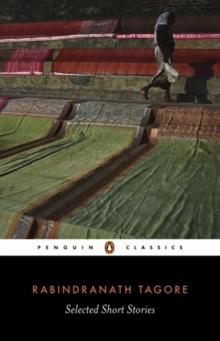 Selected Short Stories
Selected Short Stories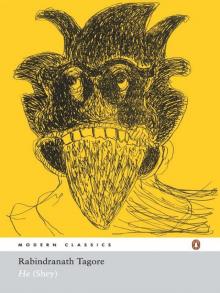 He (Shey)
He (Shey) Letters From a Young Poet 1887 1895
Letters From a Young Poet 1887 1895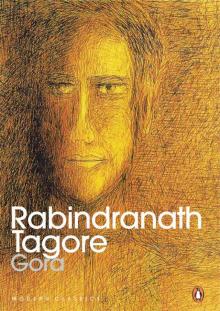 Gora
Gora Tagore Omnibus, Volume 1
Tagore Omnibus, Volume 1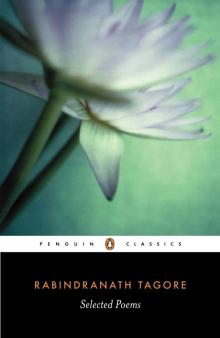 Selected Poems (Tagore, Rabindranath)
Selected Poems (Tagore, Rabindranath)